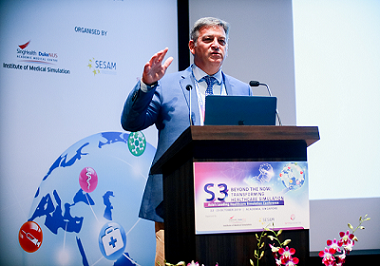Simulated patients for training of phase I medical students in Attitude Ethics and Communication [AETCOM] - a mixed method study
Introduction
Attitudes, Ethics and Communication modules (AETCOM) have now been included in the medical curriculum in India.1,2 The standard method of delivering these modules is through lectures, small group discussions and role play among students.3-5 We introduced simulated patient interactions as a teaching modality for these modules for the first time in India adopting a standard protocol “SPEAK” [Simulated Participant Encounter for AETCOM Knowledge].This study was conducted to assess the outcomes of delivering the AETCOM modules through simulated participant interactions.
Methods & Results
Cohort of phase I medical students (n=250) interacted with SP in small groups (12 students each) on the chosen scenario [gather history/obtain informed consent/patient education]. Knowledge of doctor-patient communication [pre/post-MCQ-based test], Attitude and communication skills by a scoresheet modified from the Brown’s Medical Interview Checklist were assessed.6 Faculty and student perception through anonymised online Google form questionnaire and Focus Group Discussion with student volunteers were collected.
The knowledge component (assessed by MCQs pre and post-intervention) improved after the interaction [5.3/10 to 6.4/10] without statistical significance (p=0.26). Faculty felt it was realistic, repeatable and immersive. Learners expressed that faculty guidance and peer interaction helped them to overcome the anxiety due to language issues and knowledge gaps.(Figure:1)FGD themes identified were teaching learning process, communication and interpersonal factors.
Figure:1Learner feedback
Discussion
SP interactions seem to be a powerful way of imparting AETCOM. It allows for a broader more realistic interaction with unscripted SP responses, which reflect their mental frames and attitudes. It is better than the routine role play as it offers realistic experience which may move to unexpected situations where learning finer nuances of professional communication is possible. Role plays are stereotypical, scripted by the faculty and hence sociocultural aspects & patients’ attitudes lacking. Learning through SPs fosters collaborative learning for professionalism and sociocultural issues. Acknowledgement: Medical Simulation Center, Mahatma Gandhi Medical College & Research Institute, Sri Balaji Vidyapeeth, Puducherry, India.
© 2025 SingHealth Group. All Rights Reserved.














